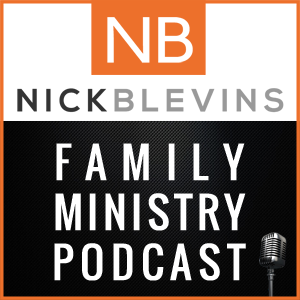In a previous post, I wrote about the importance of establishing a volunteer leadership pipeline in our ministries. Leadership pipelines provide a clear leadership path and a structure the entire ministry can be built on. As I network and work with other churches I'm encouraged to see so many churches doing this, many for the first time. One of the key roles on the pipeline, whatever you label it, is a volunteer who leads other leaders. Often times this is the highest volunteer role without being on staff. We call them Coaches.
Our Plan to Develop Coach Level Leaders
We've had Coaches for a long time in our children's ministry, but it's fairly new in our student ministry. Recruiting the right leaders for Coach-level roles is difficult because the expectation is so high. The role might require 3-5 hours/week if done well. Another challenge I know churches have is developing these leaders. We were facing that challenge too and rolled out a new plan that I want to share with you in the hopes that it can help your ministry.
The Challenge
One of the challenges we faced is that most of our Coaches had no leadership training or experience. Some had, but most of them were not used to leading a team of leaders. They had served as Leaders (the level on our pipeline, not the generic term), but most people on that level are leading small groups of kids and students. Some lead teams of adults, but there's just so much more required to be a Coach.
Another challenge we had is that some of our family ministry staff were not naturally gifted and wired to develop coaches. It was not one of their top 3 passions and we saw the impact of that as the ministry grew. Our Coaches led less and managed more. We needed a system, even if it wasn't long-term, where we could train and develop coaches in some type of rhythm and hold them accountable for the role they served in.
Coach Training
Our first move was to start having Coach Training with all Coaches from our children and student ministry teams. I am passionate about developing leaders and I love to create training content, so I led them. We had them about every other month and I simply created the content based on what we felt was needed. However, we knew this wasn't a sustainable solution.
Coach Meetings
After having a few Coach Training we had a good feel for what was needed going forward. We transitioned from having Coach Training to Coach Meetings. Three times a year we gather all family ministry Coaches and we primarily focus on these 6 things:
- Share Wins/Stories – We do this at every staff meeting, volunteer circle up, or team training, so we do it here as well.
- Provide Shared Accountability – One of the responsibilities every Coach has regardless of their specific role is to meet 1-on-1 with their team members throughout the year. At Coach Meetings, they share who they have met with and who they still have to meet with. They track it in our church management system.
- Listen to Feedback – We want to get feedback regularly from every volunteer on our teams, and the same is true with Coaches. They know more than we do about how well it's working (or not).
- Cover Our Values – We created 6 Coach Values and we cover those at each meeting. They help reinforce the culture we want to create among Coaches.
- Teach / Train – We pick one thing to focus on from a training perspective and we teach on that. Last time we taught the details of our assimilation strategy and where they lead within that.
- Vision – We re-cast vision because vision leaks, but also because Coaches are vision-casters themselves.
Coach Meetings aren't everything, of course. There's the apprenticing of new Coaches and the 1-on-1s they have with their directors, but the Coach Meetings have been a helpful supplement. My favorite part about them is the power of having them in the room together and what comes out of that.
I'm grateful for our Coaches and the significant role they play in our family ministry. We couldn't do it without them.
How do you develop volunteers who lead other leaders?
Volunteer Coach Values
Coaches in our children and student ministries can have very different responsibilities. Some lead teams of small group leaders while others lead teams that create large group experiences. One thing they all have in common is they lead teams of leaders. Here are the 6 values we created that tap into what they have in common (in no particular order). They're written in terms of who we want Coaches to be.
Connector
Connects with kids/students and knows them. Coaches primarily lead volunteer leaders, but all of them interact with kids and students on some level. We're interested in Coaches who value that interaction and work to develop those relationships.
Developer
Develops their team members and helps them grow. This is one of the more difficult roles of the Coach, and that is to help their team members grow individually. This requires them knowing their team and challenging them to get better.
Partner
Establishes a relationship with parents. Our entire family ministry is built on the belief that parents are the primary spiritual leaders for their children and the church's job is to help them thrive in that role. Coaches should always seek to meet parents and build a relationship with them.
Communicator
Communicates on time with great clarity. The core essential for every Coach is to communicate with their team. Communicate weekly via email to provide updates. Communicate about volunteer schedules. Communicate with their team individually to serve them best. Being a good communicator is key.
Recruiter
Recruits new people to the team. The best volunteer recruitment happens through an invitation. Coaches should model the importance of that by getting to know people and recruiting them to join the team.
Care-er
Cares for each team member and knows their needs. We had a little fun with the wording of this one, as you can tell. Every Coach should provide great care for their team members. People might first want to serve out of a sense of mission, but they'll love serving because of a caring community.
Those are the 6 values we came up with. The job certainly isn't easy and Coaches will naturally be better at some values than others.







Interested in hearing if you would share your different levels in your leadership pipeline from entering your ministry to the most committed role and the definitions that go with each. Lastly what are the 6 core coaching values you settled on?
Our pipeline is pretty simple>
Volunteer >> Apprentice >> Leader >> Coach >> Director
Apprentice isn’t really a level though, and you kind of apprentice heading into every level. If I had it to do over again I’d remove that one. I might re-name Volunteer as Member or something else too. They’re all volunteers and in some cases that first level is the kid/student/adult in a small group, and not a volunteer.
I’ll post the 6 values. I thought that might get asked!
Thanks and Im glad that I could be the one who asked you first about your values :~)
May I ask, what is the brief description of each of your roles and commitments of each? How do they move from one level to the next?
Thanks for such an informative blog and thanks for doing our StratOp for our church. I would recommend every church go through a StratOp and if you want someone who definitely knows his stuff I would recommend Nick as the guy to bring in!
Did you get the 6 values
Not yet, I’m sure he is busy though.
Hey Albert. You probably saw, but I posted them yesterday:
https://nickblevins.com/blog/2016/01/25/the-6-things-we-value-in-our-family-ministry-coaches/